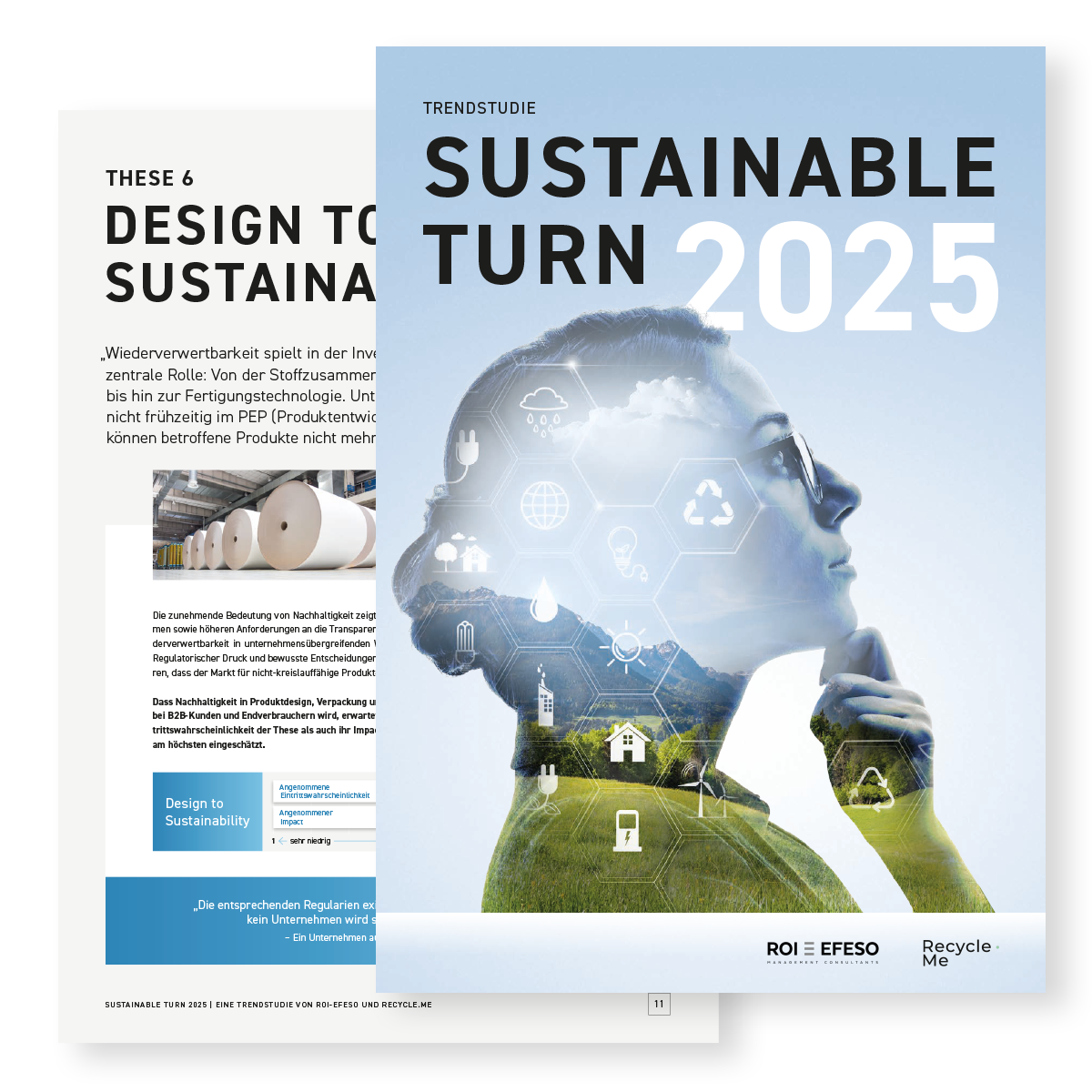More and more companies are committing to the UN’s Sustainable Development Goals. Current supply shortages of food and energy as well as catastrophes caused by climate change demonstrate the acute need for action. Demands for transparency and sustainable action are increasing, as is the pressure that customers, investors, and legislators are exerting on companies.
WHAT DOES THE FUTURE HOLD FOR INDUSTRIAL SUSTAINABILITY?
Practical insights from top decision-makers from food & beverage, mechanical engineering and the consumer goods industry
Decision-makers from manufacturing companies in the food & beverage, mechanical engineering and consumer goods sectors were surveyed for the study. In addition, the company size and customer focus (B2B/B2C) were surveyed. All respondents take a central leadership role in the transformation of their company, e.g. as CEO, COO, Head of Corporate CSR, Business Unit Manager or Leader Risk, Legal and Invest. First, the respondents evaluated the 13 formulated theses in terms of their probability of occurrence and the respective impact on their company. Whether and how the companies are preparing for the respective developments could be added openly. The evaluation was carried out both qualitatively and quantitatively. Results with a high degree of selectivity and significance were selected for presentation.
Theses for a sustainable industrial future
The study takes decision-makers back to the year 2025.
Concrete future scenarios are formulated on the basis of 13 theses that reflect on and highlight today's developments with regard to industrial sustainability. The spectrum of topics ranges from technological developments to social aspects and regulatory issues.
The decision-makers assess how likely they think the respective developments are and how great the anticipated impact on the company will be.
This provides a meaningful picture of how far leading companies have already progressed in the industrial transformation, what developments the decision-makers in the companies are preparing for, and how strongly the individual sectors will be affected.
THE 13 THESES
Thesis 1: Sustainability Imperative
Thesis 2: Next Level Business Models
In many cases, companies that operate their business sustainably already have an important differentiator. You can count on loyal customers and achieve higher prices than competitors. As resources become scarcer and the need for action continues to grow, it is likely that sustainability pioneers will continue to extend their lead over the competition.
Thesis 3: Authentic Purpose
For the young generation, the future of our planet has immense importance. Young professionals and specialists are increasingly looking at sustainability in practice when choosing an employer, for example in terms of emissions, supply chains and human resources development. Especially top talents, who are free to choose their employer and field of activity, are looking for jobs in which their work has a deeper meaning and measurable impact.
Thesis 4: Beyond Greenwashing
Commitments to sustainability must be followed by action. But developing and implementing effective strategies can pose serious challenges for companies. If structural and cultural latency prevails, and not all employees actively implement change, no change will take place. Economic pressures, such as higher energy and production costs, could also lead to the postponement of projects that are only profitable in the medium and long term.
Thesis 5: Renewables Dependency
Although Europe is supposed to reduce its dependence on fossil fuels, the expansion of renewable energies required to achieve this is progressing only slowly. Political disagreement and lengthy approval procedures are reasons for this. However, scarce raw materials and dependence on international suppliers, for example for technologies to expand solar energy, can also delay the implementation of a sustainable energy supply.
Thesis 6: Design to Sustainability
The increasing importance of sustainability is also reflected in stricter standards for industrial companies and higher requirements for the transparency of CO2 and environmental performance. The importance of recyclability in cross-company value chains and in the consumer goods sector is also increasing. Regulatory pressure and conscious decisions by companies and end consumers can lead to the market for non-recirculating products breaking away.
Thesis 7: Digital Green
Digitization and sustainable actions are important indicators for the future viability of a company - and they go hand in hand. Digital technologies, such as virtual prototyping and smart buildings, enable valuable resources to be saved. Contemporary controlling and reporting of the product-related CO2 footprint, for example using digital twins, is only possible if companies are comprehensively digitalized.
Thesis 8: Global Responsibility
Packaging consumes raw materials and contributes massively to environmental pollution. Even though Extended Producer Responsibility principally applies to packaging in Europe, regulations may differ from country to country. Harmonization of regulations through a high international standard and appropriate enforcement, would significantly advance the global economic shift towards greater sustainability.
Thesis 9: Quest for Transformation
Converting industrial production to new semi-finished products, e.g., to recyclates, can mean a great deal of effort and corresponding costs – for example, for retooling, new machines, the use of more expensive products and the documentation of the supply chains. Regardless of the extent to which individual companies within the value chain are affected, the end customers will feel the increased costs in the price.
Thesis 10: Circular Skills
Scarce natural raw materials and rising costs for their extraction, fragile supply chains and an uncertain supply situation can pose an existential threat to companies. Alternative sources of raw materials and, in particular, recycled materials are thus rapidly gaining in importance. Whether and how a company integrates into the Circular Economy at an early stage and thus secures the supply of critical raw materials could decide its future.
Thesis 11: Naughty Consumers
Sustainable products must be marketable, and the final decision here is made by the end customer or consumer. Even the most environmentally conscious customers are subject to economic necessities. Without a pricing of disposable materials that reflects their actual costs and without the political enforcement of high standards, a market for cheap, non-sustainably produced products is likely to remain.
Thesis 12: Sustainable Co-Mining
Valuable raw materials, such as metals and minerals, often remain in infrastructures, buildings, and goods of daily use for decades. These are potential future sources of important secondary raw materials. There are, however, challenging legal, technological and process requirements here. If the potential is to be leveraged, the consumers concerned must be actively involved in the process and incentivized in the long term.
Thesis 13: Sustainable Overkill
When it comes to sustainability, European companies are global leaders in many fields. However, strict requirements can sometimes also have disadvantages in the global competition between locations. If regulations in Europe become stricter and at the same time there are shifts in global value creation, measures that originallymade sense could turn into the opposite.

Download trend study
Find out now what challenges and opportunities the transformation to industrial sustainability offers and what scenarios decision-makers from leading manufacturing companies expect.
To the Download



